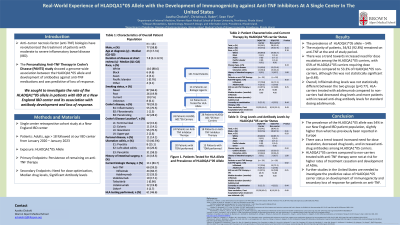Tuesday Poster Session
Category: IBD
P3635 - Real-World Experience of the Correlation of HLADQ-A0105 Allele with Development of Immunogenicity Against Anti-TNF Inhibitors at a Single Center in the United States
Tuesday, October 24, 2023
10:30 AM - 4:00 PM PT
Location: Exhibit Hall

Has Audio

Aastha Chokshi, MD
Brown University
Providence, RI
Presenting Author(s)
Aastha Chokshi, MD1, Christina A. Raker, PhD2, Sean Fine, MD, MS3
1Brown University, Providence, RI; 2Lifespan Health System, Providence, RI; 3Warren Alpert Medical School of Brown University, Providence, RI
Introduction: Anti–tumor necrosis factor (anti-TNF) medications are commonly prescribed for moderate to severe inflammatory bowel disease (IBD). However, development of immunogenicity leading to loss of response is a major concern. Previously, the Personalizing Anti-TNF Therapy in Crohn’s Disease (PANTS) study showed a genome wide association between the HLADQ-A0105 allele and development of antibodies against anti-TNF medications and was predictive of loss of response. Our goal was to investigate the rate of the HLADQ-A0105 allele in IBD patients at a New England IBD center and its association with antibody development and loss of response.
Methods: We conducted a retrospective study looking at IBD patients followed at our IBD center since January 2020. Data was collected on patients’ demographics, disease type, medication history including therapeutic drug monitoring and dose escalation, immunomodulator combination therapy, and compared between patients who were HLADQ-A0105 positive (HLA-carriers) and HLADQ-A0105 negative (HLA non-carriers). Drug levels were compared after stratification by anti-TNF medication and presence of dose escalation. Patients hospitalized in the first year after treatment initiation were excluded.
Results: A total of 131 IBD patients were identified, 66 (59.5%) of whom were on an anti-TNF medication. 54% of patients tested for HLA genotype were HLA carriers. There was a trend towards increased dose escalation among the HLA carriers, although was not statistically significant (Table 1). While there was no statistical difference in infliximab at any dose, we noted decreased drug levels and more patients with increased anti-drug antibody levels for standard dose adalimumab among HLA carriers (Table 1). The majority of patients remained on anti-TNF at the end of study.
Discussion: The prevalence of the HLADQ-A0105 allele was 54% in our population, similar to prior studies. There was a trend toward increased need for dose escalation, decreased drug levels, and increased antidrug antibodies among HLA carriers. However, while it is important to be aware of HLA carrier status for IBD patients on anti-TNF therapy, the majority of patients do not lose response and remain on anti-TNF therapy regardless of HLA carrier status. Our study was limited by small sample size and further studies are needed to investigate the predictive value of HLA carrier status on development of immunogenicity and secondary loss of response for patients on anti-TNF.
Disclosures:
Aastha Chokshi, MD1, Christina A. Raker, PhD2, Sean Fine, MD, MS3. P3635 - Real-World Experience of the Correlation of HLADQ-A0105 Allele with Development of Immunogenicity Against Anti-TNF Inhibitors at a Single Center in the United States, ACG 2023 Annual Scientific Meeting Abstracts. Vancouver, BC, Canada: American College of Gastroenterology.
1Brown University, Providence, RI; 2Lifespan Health System, Providence, RI; 3Warren Alpert Medical School of Brown University, Providence, RI
Introduction: Anti–tumor necrosis factor (anti-TNF) medications are commonly prescribed for moderate to severe inflammatory bowel disease (IBD). However, development of immunogenicity leading to loss of response is a major concern. Previously, the Personalizing Anti-TNF Therapy in Crohn’s Disease (PANTS) study showed a genome wide association between the HLADQ-A0105 allele and development of antibodies against anti-TNF medications and was predictive of loss of response. Our goal was to investigate the rate of the HLADQ-A0105 allele in IBD patients at a New England IBD center and its association with antibody development and loss of response.
Methods: We conducted a retrospective study looking at IBD patients followed at our IBD center since January 2020. Data was collected on patients’ demographics, disease type, medication history including therapeutic drug monitoring and dose escalation, immunomodulator combination therapy, and compared between patients who were HLADQ-A0105 positive (HLA-carriers) and HLADQ-A0105 negative (HLA non-carriers). Drug levels were compared after stratification by anti-TNF medication and presence of dose escalation. Patients hospitalized in the first year after treatment initiation were excluded.
Results: A total of 131 IBD patients were identified, 66 (59.5%) of whom were on an anti-TNF medication. 54% of patients tested for HLA genotype were HLA carriers. There was a trend towards increased dose escalation among the HLA carriers, although was not statistically significant (Table 1). While there was no statistical difference in infliximab at any dose, we noted decreased drug levels and more patients with increased anti-drug antibody levels for standard dose adalimumab among HLA carriers (Table 1). The majority of patients remained on anti-TNF at the end of study.
Discussion: The prevalence of the HLADQ-A0105 allele was 54% in our population, similar to prior studies. There was a trend toward increased need for dose escalation, decreased drug levels, and increased antidrug antibodies among HLA carriers. However, while it is important to be aware of HLA carrier status for IBD patients on anti-TNF therapy, the majority of patients do not lose response and remain on anti-TNF therapy regardless of HLA carrier status. Our study was limited by small sample size and further studies are needed to investigate the predictive value of HLA carrier status on development of immunogenicity and secondary loss of response for patients on anti-TNF.
Disclosures:
Aastha Chokshi indicated no relevant financial relationships.
Christina Raker indicated no relevant financial relationships.
Sean Fine: AbbVie – Advisory Committee/Board Member, Consultant. Bristol Myers Squibb – Advisory Committee/Board Member, Consultant.
Aastha Chokshi, MD1, Christina A. Raker, PhD2, Sean Fine, MD, MS3. P3635 - Real-World Experience of the Correlation of HLADQ-A0105 Allele with Development of Immunogenicity Against Anti-TNF Inhibitors at a Single Center in the United States, ACG 2023 Annual Scientific Meeting Abstracts. Vancouver, BC, Canada: American College of Gastroenterology.
